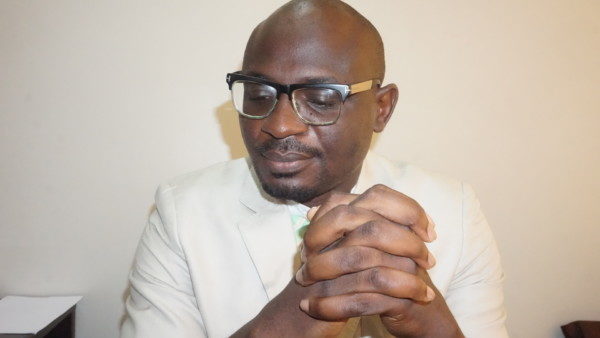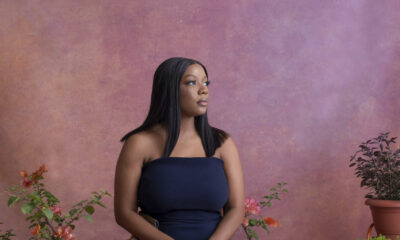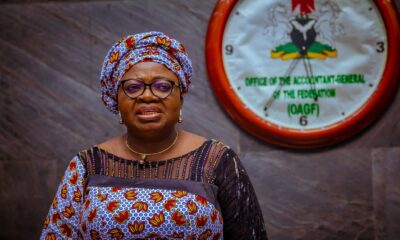Features
Michael Afenfia: Of Cows, Herdsmen & the Silence of the Rock
 What a world of difference a couple of months can make! In this case, 34 months since our President, Muhammadu Buhari made his now famous “I belong to no one” speech. For weeks, the circumstances that led to his emergence as President of the Federal Republic of Nigeria remained the hottest topic on the burner for political pundits and talk shows in the country.
What a world of difference a couple of months can make! In this case, 34 months since our President, Muhammadu Buhari made his now famous “I belong to no one” speech. For weeks, the circumstances that led to his emergence as President of the Federal Republic of Nigeria remained the hottest topic on the burner for political pundits and talk shows in the country.
It was a historic moment in the politics of Africa, and Nigerians were optimistic that the man believed to be most capable of delivering on the promised change his party ran on in the 2015 polls, was now in the saddle. Most Nigerians were sure good things would begin to happen to them – even to the archetypal “ordinary man on the street.”
A dollar would be one naira. Boko Haram would be obliterated by the retired General whose credentials as an experienced military officer was a unique selling point at a time Nigerians were living in fear of the dreaded terrorist group. The subsidy dispensation, which favoured a handful of affluent politicians and their business cronies in the corrupt cabal of oil marketers, would be crushed and Nigerians wouldn’t have to pay an arm and a foot for every litre of fuel.
To the Bring Back our Girls advocates, the promise was that every single one of the missing Chibok girls would be rescued from Sambisa forest in a Jack Bauer-styled operation lasting no more than 24 hours. His minstrels assured us that candidate Buhari wasn’t “clueless” and would put nation above self. He was his own man and there were no puppet strings.
Most importantly, we were told that corruption and misappropriation of public funds would be a thing of the past. Remember that the main thrust of the campaign was the avowed dedication to fighting corruption and bringing to book all those who had corruptly enriched themselves in the past.
Simply put, Nigerians had voted a strict disciplinarian, who was frugal in his spending and straightforward in his dealings with people. And it most certainly wouldn’t be business as usual.
That was May 29th 2015 and all that has changed. The sentiments expressed by the newly sworn-in President that Friday at the Eagle Square in Abuja filled a lot of us with optimism for the future.
Fast forward to Friday 12th January 2018 and that confidence has turned to despair. It’s not just Charly Boy, Ayo Fayose, Reno Omokri, Yinka Odumakin and Femi Fani-kayode criticising the President these days. I perceive frustration when I read tweets and commentaries from people like , both of whom are key figures in the ruling All Progressives Congress. Their angst is not a footnote; it goes to the very heart of the matter.
The condemnation of Mr. President’s lethargy, particularly on the loss of lives and wanton destruction of invaluable assets by Fulani herdsmen, is coming fast and with palpable fury. Mind you, he had in September 2017, while addressing the UN General Assembly in New York, condemned the ethnic cleansing going on in faraway Myanmar. So I suppose I’m not the only one wondering why there is graveyard silence when Nigerian lives are slaughtered in Benue, Plateau, Taraba, Ekiti and some other states in the country.
Whenever there’s a terror-related death or mass killing in the US, UK, France or Germany, the reaction from their government is swift and decisive. It is not an American or a European thing. It is a human thing to show empathy, visit and take action immediately innocent blood is shed and hundreds of people displaced from their homes and communities. When you have the authority as Commander-in-Chief and all the resources at your disposal to put an end to the killings, or at the very least, call the perpetrators to order, silence becomes baffling.
As it was during the twilight of the GEJ era, so it is now. Several forwarded jokes on WhatsApp, short videos on Youtube and Instagram lampoon what has now come to be perceived as a hapless administration, by Nigerians across all spectrums of the political and ethnic divide. It cuts across the religious stratosphere if you consider prophesies and comments by men of God. Most notable is that from Reverend Father Ejike Mbaka, who only days ago came out with a scathing rebuke against the status quo.
For those who might need their memories joggled, the most defining instance of intersection between religion and politics in the last presidential elections came when the anointer of rulers and kings, Father Mbaka, publicly denounced the then President and his wife, and proclaimed General Buhari as the chosen one. I don’t know if this portends anything, neither do I know what to make of his unexpected reversal, but I am watching that space with keen interest.
All across the land, and in my conversations with random Nigerians, there is a tangible sense that the government in power at the centre has failed us. I am beginning to hear the word “clueless” again and it’s not a whisper or a muffled echo – it has become a reverberating roar to change the changer. But Nigerians are known to be patient, so maybe they’ll wait patiently for 2019 and when the time comes, I trust they’ll do the right thing.
However, on this issue of herdsmen and other important matters that keep Nigerians awake at night, I’m sure Nigerians would like to hear directly from their leader. It would be nice to have him speak to us every now and then, not in a 10-minute scripted broadcast, but in a question-and-answer session with a crack team of journalists and reporters taking him on national and global issues. Come to think of it, as maligned as President Goodluck was by his detractors, he had the confidence to face the press in nationally televised media chats watched by millions of Nigerians home and abroad.
I know Nigerians want to know why their President chose to appoint dead men to serve on Boards and Commissions, when there are very qualified living men and women searching for opportunities. They would like to know from him why budget padding has become a norm, why he still needs N1b to prosecute a war his media aides claim has been “technically” won. And if there’s any truth to the speculations about a pending increase in the pump price of petrol.
People are anxious to hear the President explain why his appointments are thought to be skewed in favour of one region of the country and what exactly is the distinction between structural and process restructuring. Just so they are satisfied it wasn’t a construct slipped into his New Year speech by an aide determined to disguise the boss’ perceived Neanderthal proclivity.
We have many questions for Mr. President, but I doubt that his silence and this impenetrable wall he’s built between himself and the press, as well as Nigerians who would appreciate a town hall meeting with him, would provide a platform. The Vice President did a good job while the President was away, but wouldn’t it be way nicer to hear from the horse’s mouth?




















